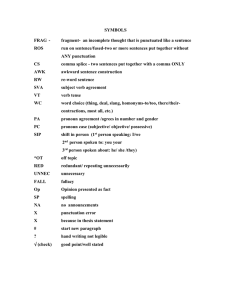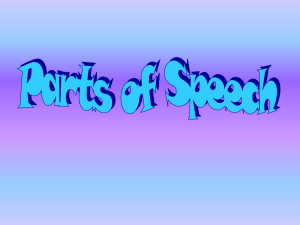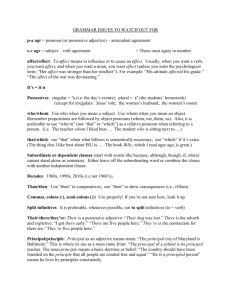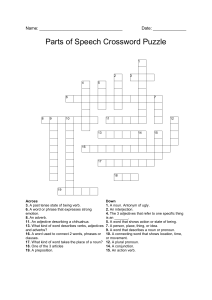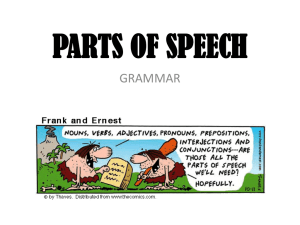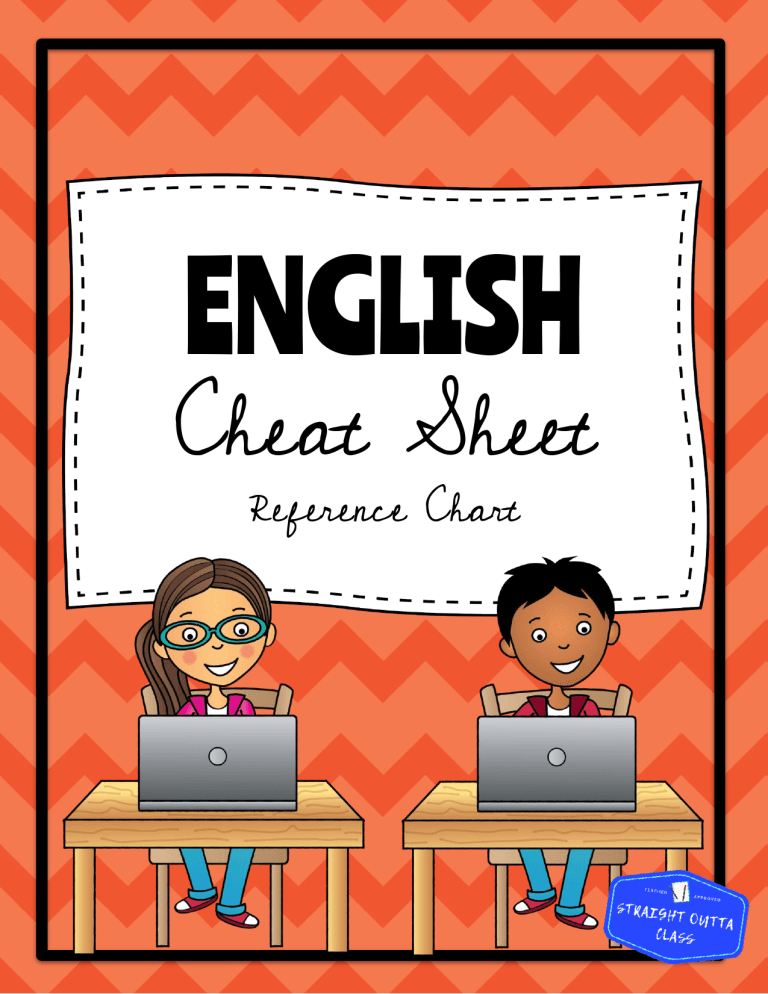
ENGLISH Cheat Sheet Reference Chart Parts of Speech NOUN – N =person, place, thing, or idea. SN = subject noun (doer of action) PN = Possessive Noun with an apostrophe that is used to show possession. *We found a book in the locker. = N *Molly’s purse is heavy and large. = PNA *Molly found a penny on the ground. = SN PRONOUN –SP = subject pronoun - A word that replaces a noun or other pronoun and used as the subject of a sentence; OP = object pronoun - a word used as an object in a sentence; PPRO = possessive pronoun - a word used to show ownership or possession *We gave the new student some help. = SP *The committee chose her as editor. = OP *It was his locker. = PPRO VERB - A word that can express actions, events, or states of being; MV = main verb - expresses main action; HV = helping verb “helps” another main verb; LV = linking verb “links” the subject of the sentence with a noun or adjective in the predicate; INF = infinitive the word “to” with an action. *Johnny ran into the tree. = MV *Johnny is running in the park. = HV *Johnny is smart and funny. = LV *Johnny learned to play his horn. = INF LINKING or BE VERBS: am, is, are, was, were, be, been, being, smell, look, taste, remain, feel, appear, sound, seem, become, grow, stand, turn HELPING VERBS: can, could, shall, should, will, would, have, has, had, may, must, might, do, did, done, does *Our group was in line for tickets. = MV *Susan was a clown in the play. = LV “was” connects Susan with the noun “clown” *Jack was running in the park. = HV INTERJECTION - An interjection is a word added to a sentence to convey emotion. Wow! Oh no! Gee! *Wow! Did you see that spaceship? ARTICLE – Also called a DETERMINER - The words A, AN, or THE used before a noun or adjective-noun. *A birthday party was planned. *An apple is my favorite snack. *The choir performed a song. ADJECTIVE - a word that describes or modifies a noun or pronoun; it answers the questions: which one? what kind? how many? *That red sweater is mine. = which one *The kid made a difficult choice. = what kind *Five astronauts trained hard. = how many? ADVERB - a word that modifies a verb, adjective, or another adverb; answers the questions: where? when? how? *Hint: they usually end in LY, but not always! *The bird was perched nearby. = where *They jogged yesterday for fun. = when *Babies cried loudly in the nursery. = how PREPOSITION - connects nouns, pronouns, and other phrases to other words in the sentence; A prepositional phrase is made up of a preposition and an object and can have an article or adjective. Here are some examples. aboard, about, above, according to, across, across from, after, against, along, alongside, amid, among, apart from, around, aside from, at, because of, before, behind, below, beneath, beside, besides, between, beyond, by, despite, down, during, except, for, from, in, inside, instead of, into, near, of, off, on, onto, out, out of, outside, over, past, regarding, through, throughout, to, toward, under, underneath, until, unto, up, upon, with, within, without CONJUNCTION - connects words, phrases, and sentences in a sentence. There are two types: Coordinating Conjunctions: And, Or, But, For, So, Yet, Nor, Either, Neither Subordinating Conjunctions: examples After, Although, As, As If, As Long As, As Though, Because, Before, If, In Order That, Provided That, Since, So, So That, That, Though, Till, Unless, Until, When, Where, Whereas, While ©2018 Straight Outta Class COMMA RULES SERIES – Use a comma to separate each noun, verb, or adjective in a series of three or more. *The cheerleader yelled, cheered, and jumped for the football team. DATES/ADDRESSES – Use a comma to separate items in dates and addresses. *Today is March 2, 2001. He lives at 109 Oak Street, Mont Belvieu, Texas. CITY/STATE – Use a comma to separate city & state. *We visited Topeka, Kansas, for our summer vacation. INTRO WORD – Use a comma to set off words such as well, yes, and no, when they begin a sentence *Yes, I would like to go to the park with the group. INTRO PHRASE – Use a comma to separate an introductory phrase when it begins a sentence. Use a comma to separate two or more prepositional phrases. *When the shipment of flowers arrived, the florist picked up the boxes at the station. *(At the town meeting)(in the council room), I voted for a new mayor. CAPITALIZATION TOOLS 1. First word of a sentence 2. Pronoun I 3. Names of people 4. Proper nouns 5. Proper adjectives 6. Opening of letter 7. First word in letter closing 8. Title of a work 9. First word in direct quotation PUNCTUATION TOOLS Ending Punctuation ! ? . 1. At the end of a sentence Periods 2. After abbreviations, End of sentences Apostrophes 3. In possessives 4. In contractions Semicolons 5. In compound sentences APPOSITIVE – Use commas to set off an appositive phrase when it interrupts a sentence. *John, our team captain, broke his ankle and had to leave the game. Colons 6. After opening business letter 7. Before list of words of phrases 8. In time INTERRUPTER – Use commas to set off interrupting phrases in a sentence. *Our math teacher, by the way, was also the tennis coach for high school. Quotation Marks 9. To set off a direct quote COMPOUND SENTENCE – Use a comma with a conjunction (and – or – but – so – for – yet) to separate two simple sentences in a compound sentence. *Our director won an award, and we organized a party for him. SIMPLE – has only one independent clause (subject/predicate) ~may have compound subjects or verbs *Taylor ran to the store today. DIRECT QUOTATION – Use a comma to set off a direct quotation. “You may have a piece of pizza,” said the polite student. DIRECT ADDRESS – Use a comma to set off a person’s name when you address them directly. *Mary, will you be working on the computer? *Will you be working on the computer, Mary? LETTER PARTS – Use a comma after the greeting and closing of a friendly letter. COORDINATE ADJECTIVE – Use a comma to separate two adjectives together. *The old, bald man wore a funny-looking tie. SENTENCE STRUCTURE COMPOUND – made up of two or more simple sentences joined by a coordinate conjunction (and, or, but…) *Taylor ran to the store, and he bought fruit. COMPLEX – contains one independent clause and one or more dependent clauses (can’t stand alone) joined with a subordinating conjunction. *Since Taylor ran to the store, he was tired. COMPOUND/COMPLEX – contains two or more independent clauses and one or more dependent clauses. *When Taylor ran to the store, he bought fruit, and he used all his money. ©2018 Straight Outta Class Welcome to Straight Outta Class Resources! I create quality teacher resources and materials because I know as busy educators, you don’t have the time. No need to reinvent the wheel when you can find what you need on Teachers Pay Teachers. I hope you find my resources useful and beneficial to you and your kiddos. If you have questions, comments, or concerns about my products, please email me at straightouttclass65@gmail.com. I value your thoughts and suggestions as professional educators. All work is copyrighted. You may not reuse, sell, or distribute any part of the resource as your own. My store succeeds when you leave feedback, so please take a quick minute to leave your rating and comments. If you share, post, or mention my products on social media, thanks in advance for including a link to my TPT store https://www.teacherspayteachers.com/Store/Melissa-Castillo-Straight-Outta-Class I look forward to hearing from you and learning how you used this product with your classes. My store is growing daily, so be sure to stop back by to see what’s new. Please leave feedback by following the link here or clicking on my logo I love new followers ! Follow me on TPT here Click the icons to find me on social media Visit my blog www.straightouttaclass.com Check out these other great products! Artistic Credits https://www.teacherspayteachers.com/Store/Teach-Reflect-Create https://www.teacherspayteachers.com/Store/The-Artbrarian https://www.teacherspayteachers/Store/Clever-Cat-Creations https://www.teacherspayteachers.com/Store/Lovin-Lit
